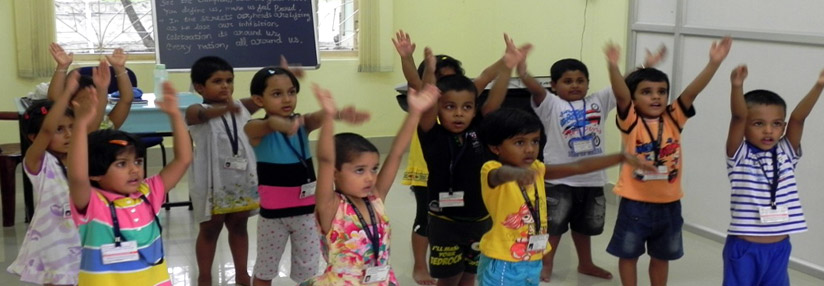Curriculum

Teaching
The school believes that education is concerned with pupils as persons...Teaching
- The school believes that education is concerned with pupils as persons, not with how they can be trained only for a career.
- The school encourages pupils to think for themselves, and tries to kindle their curiosity, so that they may venture out on their own beyond the beaten track of the syllabi.
Principle
At the nursery level, the child’s process of growing out of oneself is made happy ...Principle
- At the nursery level, the child’s process of growing out of oneself is made happy and pleasant through an abundance of colour, play, music, rhyme, and rhythm.
- At the primary level, the imparting of knowledge in various forms begins through the study of languages, literature and other subjects.
- As the input of knowledge increases, so does the emphasis on the training of the mind and the power to think and judge for oneself.
- Pupils are encouraged to ask questions, voice their doubts, verify what they are told and taught.
- Teachers try to instil in the pupils a sense of perspective, a sense of right and wrong, and to make the pupils think of others more than of themselves.
Method
Uniformity and accuracy are ensured through drawing up of lesson plans...Method
- Uniformity and accuracy are ensured through drawing up of lesson plans.
- Each teacher makes sure that a pupil not only understands but also assimilates what he has read and heard.
- Depending on the subject concerned, the first stage of an assessment may consist of oral and/or blackboard work.
- Before a pupil is asked to do any written work, answers to probable questions are discussed wherever possible. Thereafter, class assignments are corrected in detail, corrections of serious errors being entered in the body of the exercise itself.
- The corrected class assignments are sent to parents for scrutiny and signature.
- Very little homework is set, and it consists mostly of handwriting, correction of errors, revision of work done in class, and learning some specified lines of a poem by heart, etc.
- In the case of slow learners, specific tasks may be set by the teachers concerned.
- Guardians are earnestly requested not to help pupils with these tasks, for the errors committed help a teacher to understand the actual progress made by the pupil. All that a guardian needs to do is to supervise: see to it that the pupil does the work that he has been asked to do.
Teacher Pupil ratio
The teacher:pupil ratio never exceeds 1 : 30Teacher Pupil ratio
- The teacher:pupil ratio never exceeds 1 : 30.
- Pupils have free access at all times to their teachers, who will give them all the attention and help they need to solve their academic problems as also any others that they may have.
- Though pupils will spend only a part of the day in the School, the aim will be to make them feel at home and encourage them to open out and grow naturally.
Remedial Classes
The School wants a pupil to excel as much as his parents ...Remedial Classes
- The School wants a pupil to excel as much as his parents do.
- While every effort will be made at School to provide a pupil with the guidance and attention that he needs, at least one of the parents must give some time to him, not only to ensure that he revises the lessons taught in class or completes the tasks set, but to give him the company he needs.
- A pupil should not need any special help at home.
- Additional guidance or special training, if and when necessary, will be provided by the School by way of remedial classes at no extra charge. These classes will be designed and held in accordance with the special needs of each child or a group of children either in parallel with general classes or separately, on Saturdays and/or holidays, on the School premises or at the residence of a teacher of the School. We earnestly request a guardian to cooperate with us in this matter by ensuring that a pupil attends these classes regularly.
- A recommendation to attend these classes must not to be taken as an unfavourable assessment of his merit. On the contrary, such a recommendation assumes that a pupil has the capacity to do better and all that he needs is some special attention or guidance in some specific areas, and that also only for some time.
Medium of Instruction
The medium of instruction is English...Medium of Instruction
- The medium of instruction is English
- As vernacular languages, Bengali and Hindi are taught with utmost care, and all efforts are made to make pupils aware of their heritage as Indians.
Parent Teacher Meetings
Parent-Teacher Meetings are held at regular intervals ...Parent Teacher Meetings
- Parent-Teacher Meetings are held at regular intervals and on prior notice.
- Guardians may meet the Subject Teachers/Class Teachers/Teacher-in-Charge on any working day by previous appointment.
- They may also meet the Principal by previous appointment.
Assessment
Nursery I to Class II - Pupils of these classes are notAssessment
1. Nursery I to Class II
Pupils of these classes are not required to sit for any examination. They are assessed on the basis of the work done in class throughout the Academic Year.
2. CLASS III and above
Pupils are assessed on the basis of class assignments and two examinations in an Academic Year, viz. a Half-Yearly Examination and an Annual Examination.
The guidelines of the affiliating Board, viz. CBSE, will be followed in any system of evaluation that the Academic Council recommends and the School adopts.
Academic Year & School Hours
Each Academic Year commences in April and ...Academic Year & School Hours
Academic Year
Each Academic Year commences in April and ends in March the following year.
Each Academic Year is divided into three terms:
(a) April/May to September/October (inclusive of Summer Vacation)
(b) September/October to December (exclusive of Autumn and Christmas recesses)
(c) January to March
Though the number of terms will remain the same, the duration of each term may vary from year to year.
School Hours
Nursery I to Class II : 9.00 a.m. to 1.00 p.m.
Classes III and above : 9.00 a.m. to 3.00 p.m.
School hours may be changed in the academic interest of pupils or as advised by the CBSE.
On specified days of the week, pupils may be required to stay back after regular school hours for extra-curricular activities, remedial/special training classes, etc.









